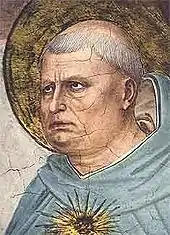Portal:Philosophy/Selected article/4
Saint Thomas Aquinas, O.P. (also Thomas of Aquin or Aquino; ca. 1225 – 7 March 1274) was an Italian priest of the Catholic Church in the Dominican Order, and an immensely influential philosopher and theologian in the tradition of scholasticism, known as Doctor Angelicus (the Angelic Doctor) and Doctor Communis or Doctor Universalis (the Common or Universal Doctor).[1] He is frequently referred to as Thomas because "Aquinas" refers to his residence rather than his surname. He was the foremost classical proponent of natural theology, and the father of the Thomistic school of philosophy and theology. His influence on Western thought is considerable, and much of modern philosophy was conceived as a reaction against, or as an agreement with, his ideas, particularly in the areas of ethics, natural law and political theory.

- See Pius XI, Studiorum Ducem 11 (29 June 1923), AAS, XV. The title Doctor Communis dates to the fourteenth century; the title Doctor Angelicus dates to the fifteenth century, see Walz, Xenia Thomistica, III, p. 164 n. 4. Tolomeo of Lucca writes in Historia Ecclesiastica (1317): “This man is supreme among modern teachers of philosophy and theology, and indeed in every subject. And such is the common view and opinion, so that nowadays in the University of Paris they call him the Doctor Communis because of the outstanding clarity of his teaching.” Historia Eccles. xxiii, c. 9.